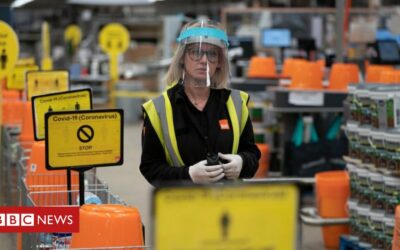The governor of the Bank of England has called for the government to “stop and rethink” the furlough scheme.The Job Retention Scheme is due to finish at the end of next month.But speaking on a webinar hosted by the British Chambers of Commerce, Andrew Bailey suggested specific sectors may benefit from further help.There are fears unemployment could spike when the furlough scheme ends, as firms struggle to retain workers. In August, Mr Bailey told the BBC he backed ending the scheme, saying workers should be helped to move on rather than stay in unproductive jobs.But on Tuesday, he suggested he was now open-minded about further intervention.He said the furlough scheme “has been successful” and that he supported the chancellor’s decisions, not wanting to “tie his hands”. But he added: “We have moved from a world of generalised employment protections, to specific and focused areas.”Mr Bailey noted that at the peak of the crisis, about 30% of private sector employers were using the furlough scheme, but it was now used most heavily by industries such as hospitality, retail and culture. “[Furlough] has helped manage the shock, to firms and to labour [but now] the use of it, as far as we can tell, is more concentrated,” he said.”I think it is therefore sensible to stop and rethink the approach going forward, without any commitment to what that might be.”Earlier in the day, Whitbread, which owns Premier Inn and Beefeater, announced plans to cut 6,000 staff just days after the furlough scheme is due to end in October. Meanwhile, Wetherspoon said it would shed up to 450 workers at pubs in airports.And Mr Bailey’s comments were made just hours before the Prime Minister Boris Johnson took to his feet in the Commons to reinstate guidance that office workers stay at home and confirm that pubs and restaurants will be forced to close at 22:00 from Thursday. UK Hospitality said the move was “effectively a lockdown” for city centre bars and restaurants.”This is a huge, huge blow to hospitality and it will be potentially fatal for many businesses,” it said.Mr Bailey’s comments echo the opinion of Labour leader Sir Keir Starmer, who has called on the government not to remove all support in one go.
BBC Business News Articles
'Closing pubs at 10pm halves your takings'
Closing pubs early may not seem like a big step but the hospitality industry is warning it will have devastating impact on the sector.”People have this vision, it’s just a few blokes standing at a bar at 10.30. What does it matter?” says Oliver Vaulkhard, who runs venues across north east England.”10 o’clock doesn’t sound dreadful, but it does halve your revenue,” he said.The new rules will come into force in England on Thursday.All pubs, bars, restaurants and other hospitality venues in England will have to shut at 10pm. Prime Minister Boris Johnson said this will mean “closing and not just calling for last orders”.Businesses must also ensure customers are served at tables of no more than six and groups are not permitted to mingle.Pub owners say the earlier closing time will be “absolutely devastating” for some venues and will affect takings not just at late night venues, but at restaurants too.”You can sit people between 7 and 7.30pm and when they’re gone they’re gone. You can’t get that 9 o’clock sitting,” Mr Vaulkhard told BBC Radio 5 Live.The Vaulkhard Group only has six of its 15 venues open currently; its music and night club settings remain closed and those that are open were trading at around 60% until last week.Tighter restrictions already introduced in the north east to limit the spread of the virus, had reduced takings over the weekend by half again, Mr Vaulkhard said.Free mixingThe night-time economy is considered a high-risk area for the spread of the virus, because people adhere to the rules less strictly after consuming alcohol and in venues where they are used to mixing freely.Cabinet Office Minister Michael Gove told BBC Breakfast that there was evidence the 22:00 closing time has had a “beneficial effect” in the areas where the restriction has already been tried, such as Bolton.But the Night Time Industries Association said if pubs and bars had to close at 10pm there was likely to be “a surge of unregulated events and house parties which are the real hot beds of infection”.Scotland’s First Minister, Nicola Sturgeon, is due to make an announcement on further restrictions in Scotland later, which could also include curfews for hospitality venues. Pubs must close at 11pm already in the six counties that are under tighter lockdown measures in Wales.’Final nail'”These restrictions are a further, potentially fatal, blow for many hospitality businesses,” said Kate Nicholls chief executive of trade body UK Hospitality.”Most disheartening is the announcement that they are potentially in place for six months. Lots of businesses will not survive this and we are going to see more and more people lose their jobs.”The curfew was “disastrous news” said Martin Wolstencroft who manages Arc Inspirations, which runs 17 bars and restaurants across Leeds, Manchester, York and Newcastle.”This is going to be the final nail in the coffin for many,” he told the BBC.”It’s just so frustrating, so negative. After 10 o’clock is really when we start making money because that’s when we start getting busier.”Maximum virus suppression for minimum economic impact seemed to be one of the principles behind today’s announcements. Even a two week “circuit-breaker” lockdown, which is one option that’s been discussed, could have hit the size of the economy to the tune of 5-10%. For now we’ve avoided that, but it remains held in reserve in case the virus continues to spread exponentially. The new information for both customers and business owners is that the public faces six months of restrictions. This will act as its own form of gravity in those sectors already hardest hit by the shift to a more socially distant Britain. That’s because, for large parts of the economy, the impact of the pandemic comes not just from government-mandated restrictions, but also from people choosing to behave differently.Banks are already fretting about how to deal with high anticipated default rates on some support loans. The government will be under pressure to extend its bridge of support, at least in the most-affected sectors, well into next year.
Kingfisher to hand back £23m of UK furlough cash
B&Q owner Kingfisher is to hand back £23m in UK furlough cash after a do-it-yourself boom due to coronavirus.Second-quarter home improvement sales rose as more people worked from home and looked at fresh ways to use space during the pandemic, Kingfisher said.People in England have been told to work from home if possible after a period of more relaxed restrictions.UK firms have voluntarily returned more than £215m to the government in furlough scheme payments.The coronavirus crisis has badly hit many parts of the economy, but some firms are seeing benefits.Pre-tax profits for the company as a whole jumped more than 62% to £98m in the half year, after a strong second quarter.”The crisis has prompted more people to rediscover their homes and find pleasure in making them better,” said Kingfisher chief executive Thierry Garnier. “It is creating new home improvement needs, as people seek new ways to use space or adjust to working from home.”The crisis also boosted shopping online. Kingfisher’s e-commerce sales rose 164% in the first half of the year and now represent 19% of total sales, up from 7% in the same period last year.Bust then boomAfter Covid-19 hit Kingfisher sales in the first quarter, second-quarter sales made a strong recovery, the company said.The group owns B&Q and Screwfix in Britain and Castorama and Brico Depot in France and other markets.It said half of its staff were on job retention schemes in the UK, France, Spain and Romania in April, but that had dropped to about 10% by the end of May as Kingfisher reopened stores.Apart from staff who were vulnerable, all employees had returned to work by 1 July, Kingfisher said.Over the six months to 31 July, the group claimed £55m in state aid in its different markets, including the £23m it intends to repay in the UK.However, a spokesman for the group said the situation in France was “very different” and that profit had been hit by an extended period of lockdown.Furlough moneyUK firms have voluntarily returned millions of pounds to the government in furlough scheme payments they did not need or took in error. More than 80,400 employers have returned cash they were given to help cover workers’ salaries, according to HMRC figures.But the money that has been returned is a tiny part of the £35.4bn claimed under the scheme up until 16 August. Officials believe £3.5bn may have been paid out in error or to fraudsters.Under the Coronavirus Job Retention Scheme (CJRS) – or furlough scheme – workers placed on leave have received 80% of their pay, up to a maximum of £2,500 a month.At first, this was all paid for by the government, but firms are now having to make a contribution to wages as well.
'Lack of investment' behind delayed court cases
When Louise Westra and her partner decided to adopt a child in November 2018, they were aware of the long process that was ahead of them, but they were not to know that the coronavirus pandemic would hold them back from completing the adoption of their son. On 27 March, their petition was due in court. As lockdown had taken effect, telephone conferencing would be used instead of going to court.However, after the phone call, Ms Westra received an email from her solicitor explaining that the papers had not been served to the biological parents of the child. This continued every month after lockdown, as it wasn’t possible for the papers to be physically served.”It’s farcical because one of them is the biological father who lives with the biological mother who has had her petition but the biological father hasn’t and they live in the same premises,” Ms Westra says.Serving papers has to be completed by post via Royal Mail or in some cases lawyers would instruct a process server to physically take the papers and hand them to the person.”It sounds very archaic but if [the person] won’t take them by hand, the processor can drop the papers near them and tell them what the document contains and that’s technically counted as full service,” says Rebecca Ranson, a solicitor for Maguire Family Law.Unless a judge approves it, emailing or any other forms of digital communication are not considered valid – even though the majority of people in the UK have access to email and the internet. It is this kind of process, in need of a digital upgrade, that is frustrating for Ms Westra.Ms Westra’s case is one of many that have been delayed. The number of outstanding Crown court cases was 43,676 on 26 July, and the entire backlog across magistrates’ and Crown courts is more than 560,000. The Commons Justice Committee has announced an inquiry into how these delays could be addressed. The reality, however, is that there was already a huge backlog back in December, and Covid-19 has just exacerbated an existing problem. Cases like Ms Westra’s have been affected by the pandemic, but many lawyers believe that the legal system could have been better prepared through technology investment over the years. “We’ve got people being held for longer than they otherwise would be, and for every person in custody waiting for trial or waiting on bail for trial, there are witnesses, and complainants and their families awaiting a resolution. Whether it’s the lack of technology links in prison, using Skype and improvising or not having enough Nightingale courts – it all boils down to a lack of investment,” says Joanna Hardy, a London-based barrister.More Technology of BusinessIn 2016 HM Courts & Tribunals Service began a £1bn court reform programme. This included a video-conferencing tool called the Cloud Video Platform (CVP), which allows for a dedicated private conference area, so criminal lawyers can speak to their clients without visiting prison.A programme for testing and adopting video technology was planned out until 2022, but in the pandemic, the government had to get CVP up and running in 10 weeks. This has since been extended to civil courts. But this implementation has been challenging, as there are only a restricted number of physical video links allowed.”As we weren’t ready for this huge technological revolution no-one had manned the tech rooms or built enough rooms on the other end in the prison. We can have as many laptops as we like, as much software as we like but if we can’t put a prisoner into a room with a screen, the other end is pointless,” Ms Hardy says.According to Ms Hardy, the waiting times to get these slots have been “completely unacceptable”, and it has meant that sometimes hearings had to go ahead without the defendant present.”It’s like human beings failing where technology could have bridged the gap,” she says. A Ministry of Justice spokesperson said that it had offered more than 400 CVP meeting rooms since the outbreak of coronavirus, but added that it is taking steps to increase the available capacity of video conferencing at some locations by extending operating hours. The spokesperson said that the MoJ is also undertaking urgent action to increase the physical number of video link outlets at critical sites. At the moment, criminal trials are going ahead using social distancing – meaning sometimes a second courtroom is linked by technology, but this is creating further backlogs, as it means one case is occupying the same space as two.Justice, the all-party law reform and human rights organisation, has trialled a virtual jury trial with a mock case, and suggested it should be considered as a possible option, but this hasn’t been taken on by the courts. The issue with virtual jury trials is whether or not they could affect the outcome of a trial. Some lawyers feel like juries should see a witness, feel an exhibit and dispense justice to a fellow human being in the confines of a court room. “You can lose the impact of cross examination. When you’re challenging their evidence in person it’s easier to get them to trip up if they’re not being honest, whereas if they’re on video it might be easier for them to cover it up,” says Jodie Hill, solicitor and managing director of Thrive Law, an employment law specialist.For smaller hearings, online alternatives could be here for the long term, as it means lawyers don’t have to travel all over the UK unnecessarily. This doesn’t mean that every hearing that can be done remotely, should be done remotely.”We don’t want overkill. We think some cases still need to be in the room, particularly if you’re dealing with vulnerable people or sensitive cases. It has to be a balancing act of harnessing the benefits of technology and thinking about the specific case,” says Ms Hardy.
FinCEN: Why gold in your phone could be funding drug gangs
A gold refiner that was used by criminals to launder drug money has been allowed to sell gold into global supply chains used to make smartphones and cars.International investigators concluded that the Dubai-based trader Kaloti was buying gold from criminal networks.The US Treasury was urged by law enforcement six years ago to warn the world that it was a “primary money laundering concern”.But the warning was never given. As a result, Kaloti has continued to sell tonnes of gold to companies in the supply chains of Apple, General Motors and Amazon, which use the precious metal in components. This has put firms and millions of consumers at risk of unwittingly funding criminal activity.The US Treasury did not respond to requests for comment. Kaloti’s representatives said it “vehemently denied” it was knowingly involved in any crime or misconduct.’Honey Badger’Confidential documents seen by the International Consortium of Investigative Journalists (ICIJ) and the BBC reveal the US Treasury was urged by investigators in 2014 to issue the warning after a three-year investigation.Codenamed “Honey Badger” and led by the Drug Enforcement Administration (DEA), the investigation concluded that Kaloti was involved in a scheme to transport or transfer “tremendous amounts of illicit value through the use of gold as a commodity”.Under the scheme described in the documents, criminals anywhere in the world could use drug money or other unlawfully obtained cash to buy scrap gold such as second-hand jewellery and bring it to Kaloti. In exchange for the gold, according to investigators, Kaloti would offer bulk cash or send a wire transfer to them.
Media playback is unsupported on your device
In 2014, the DEA recommended that the US Treasury should publicly designate Kaloti a “primary money laundering concern” under the US Patriot Act, which would have made it too risky for global banks to do business with them, freezing the group out of the global financial system. But the US Treasury never took action against Kaloti. Former officials said it put off a decision on the recommendation, concerned about the reaction of the United Arab Emirates, a key diplomatic ally, where Kaloti was based. When the UAE failed to act on its own initiative, the investigation was shelved. Suspicious activity Kaloti did not have the chance to see or challenge any of the evidence as they were not questioned by investigators and there could be undisclosed reasons justifying why the report wasn’t acted upon. Attempts to obtain an explanation from the US Treasury failed to draw a response. The investigation, which the US government has never made public, was supported by a flood of reports of suspicious activity from banks across the world handling Kaloti’s money. Lenders including Deutsche Bank and Barclays submitted 34 separate reports about Kaloti to the US Treasury’s Financial Crime Enforcement Network (FinCEN), highlighting as suspicious thousands of transactions from 2007 to 2015 totalling $9.3bn (£7.26bn). In 2017 a money laundering gang was convicted in France of laundering the proceeds of drug sales all over Europe including the UK.Last October, BBC Panorama revealed that a company controlled by the gang, Renade International, had sold $146m (£114m) of gold to Kaloti in 2012 alone – part of $5.2bn of gold purchases paid for with cash. Kaloti vehemently denies ever acting improperly and says it has never been accused or contacted by any US authority about wrongdoing.It says it performs full due diligence on all customers and suppliers. Lawyers for the firm said it had successfully passed audits each year against all regulatory and legal standards.Supply chain fearsThe DEA-led taskforce investigating Kaloti submitted a report of their investigation and recommended the primary money laundering designation in August 2014. But after the designation didn’t materialise, gold sold by Kaloti has continued to end up in major supply chains.Apple’s list of approved suppliers includes entities which have purchased tonnes of gold from Kaloti, including Valcambi, one of the largest gold refiners in the world, based in Switzerland. All modern smartphones feature components made with gold, which is a highly conductive metal.This year the anti-corruption watchdog Global Witness reported that in 2018 and 2019, Valcambi purchased up to 20 tonnes of gold directly from Kaloti and a further 60 tonnes from a related entity. A further report by the Tech Transparency Project listed two further Swiss refiners which had purchased gold from Kaloti and were also on Apple’s list of suppliers. Valcambi said it would not confirm or deny buying gold from Kaloti. The company said it only purchases gold from its suppliers “where the company can fully ensure the identification of the origin of the gold”.In a statement, Apple said it was committed to responsibly sourcing for its products: “If a refiner is unable or unwilling to meet our standards, they will be removed from our supply chain. Since 2015, we’ve stopped working with 63 refiners of gold for this reason.”Several thorough and independent reviews have been conducted since 2015, and there is no evidence that any gold from Kaloti enters Apple products.”Kaloti is listed as being in the supply chain for General Motors and Amazon, according to data submitted to the Securities and Exchange Commission, the US regulator.General Motors, which uses gold in car parts such as catalytic converters, said it was committed to responsible sourcing of goods used in its manufacturing and had not done business with Kaloti directly. It said none of its suppliers had shared any compliance issues or concerns regarding Kaloti. Amazon said it was “committed to ensuring that the products and services we provide are produced in a way that respects human rights and the environment. We engage with suppliers that are committed to these same principles. “We expect suppliers to support our effort to identify the origin of designated minerals used in our products.”Investigators who had worked for years to expose money laundering linked to Kaloti describe themselves as “incredibly frustrated” by the US Treasury’s handling of the matter. “We put a tremendous amount of work and effort over three years into the case – we all lived and breathed it,” said one of the people on the DEA-led taskforce, speaking anonymously.”We were very confident we had more than enough for them to be designated. It pissed us all off.”
Covid: Pubs and restaurants in England to have 10pm closing times
All pubs, bars, restaurants and other hospitality venues in England must have a 22:00 closing time from Thursday, to help curb the spread of coronavirus.The sector will also be restricted by law to table service only. Cabinet Office minister Michael Gove said people should also work from home “if they can” and trials of spectators at sports fixtures would be “paused”.The full measures will be set out by the prime minister in the House of Commons later.Boris Johnson will also address the nation in a live broadcast at 20:00 BST on Tuesday.It comes as the UK’s Covid-19 alert level moved to 4, meaning transmission is “high or rising exponentially”.Mr Gove told BBC Breakfast that there was evidence the 22:00 closing time has a “beneficial effect” on the spread of the virus in areas where the restriction has already been tried.How does the Covid-19 alert level system work?
How many cases are there in your area?
He denied the government was wrong to relax coronavirus measures against the virus in the summer, describing the new restrictions as a “recalibration which we hope and believe will be enough to check the spread”.”We’re not going back to the sorts of measures that we had in the spring,” he said.”If people can work from home they should”, he added. “But I stress that it’s very important that those people whose jobs require them to be in a specific workplace do so.”Mr Gove said plans for sport with live audiences to return from 1 October were being halted “for the moment” because of the risk of fans mixing on the way to the stadium or during half-time.The government’s chief scientific adviser Sir Patrick Vallance has warned there could be 50,000 new coronavirus cases a day by mid-October without further action – which, he said, could lead to more than 200 deaths per day by mid-November. Prof Callum Semple, an expert in outbreak medicine at the University of Liverpool, told BBC Breakfast current data was “tracking the worst-case scenario quite accurately”.He said there was now a rise in hospital admissions, including among women aged 20 to 40, who were at risk of exposure to the virus because of their work in hospitality, caring roles or because they were parents of schoolchildren.The UK needed “quite a lot more” restrictions in place to prevent the spread, and the hospitality industry will probably have to take another “hit”, Prof Semple said.Andy Wood, chief executive of the Adnams brewery, told the Today programme that the pub industry had taken health messages seriously and it seemed “incongruous” to be singled out.He said the industry was still “on life support” with about 900,000 jobs at risk.On Monday, a further 4,368 daily cases and 11 deaths were reported in the UK. Also:Further restrictions will also be announced in Scotland on Tuesday
Restrictions on households mixing indoors will be extended to all of Northern Ireland
Also from 18:00 on Tuesday, four more counties in south Wales will face new measures, including a 23:00 curfew for pubs and bars
New measures will also come into force in Lancashire, Merseyside, parts of the Midlands and West Yorkshire from Tuesday.
Other areas of England, Scotland and Wales are already under local lockdown, with restrictions including a ban on mixing with other households.
What difference will it make?People are understandably asking what difference closing at 22:00 makes. Coupled with the table service law, it will be little more than a marginal gain.But what ministers hope is that the move, along with the rule of six, will act as a warning to the public that efforts to curb the virus need to be redoubled.What remains to be seen is whether any other restrictions will accompany this move.It seems inevitable that the virus will continue to spread – that’s what respiratory viruses do during winter, especially one for which there is limited immunity and no vaccine.But how quickly and widely – no one knows. The risk of trying to suppress the virus is the government will soon find itself having to make another decision about further steps. How far are ministers prepared to go? Every restriction that is taken has a negative consequence to society. But the nature of the virus means lives will undoubtedly be lost the more it spreads. Balancing those two harms will define the next six months.The cabinet will meet on Tuesday morning and Boris Johnson will also chair a Cobra emergency meeting – which will be attended by the first ministers of Scotland, Wales and Northern Ireland.Speaking about the new closing times, a No 10 spokesperson said: “We know this won’t be easy, but we must take further action to control the resurgence in cases of the virus and protect the NHS.”Tighter restrictions on pub and restaurant opening times are already in place in parts of north-east and north-west England, and Wales.Liberal Democrat leader Sir Ed Davey described the new rules as “a step backwards”, as he urged the government to fix the test and trace system and help the hospitality sector.”After people have already been through so much hardship, we cannot allow thousands of jobs to disappear overnight,” he said.There were also calls for support from within the hospitality sector. Kate Nicholls, chief executive of trade body UKHospitality, said the new rules should be “applied with flexibility”, and that a 22:00 closing time was “bad for business and bad for controlling the virus”. She added: “Table service has been widely adopted in some parts of the sector since reopening, but it is not necessary across all businesses, such as coffee shops.”Meanwhile, Michael Kill, chief executive of the Night-Time Industries Association, warned the move would result in a “surge of unregulated events and house parties”. If Boris Johnson had decreed a year ago that he was going to call last orders on the pub at 22:00, the ravens might have left the Tower.But given the terrible warnings from the government’s top scientists on Monday, the kind of strict measures that ministers had been discussing – and the extent of restrictions that many people are already living with in some of our towns and cities – you might wonder if what the prime minister has ended up deciding is less stringent than it might have been.As we have talked about many times, Downing Street is all too aware of the economic havoc the restrictions around the pandemic have caused.Logically, therefore, it has always only wanted to take action when it has felt absolutely urgent. It is also the case that, as we enter a second surge, more is understood about the virus itself.That means the government ought to be able to take a more sophisticated approach to managing the spread, rather than blunt, blunderbuss nationwide measures.At least for now, the prime minister has concluded there is a narrow, but real chance to put the brakes on the outbreak before taking more draconian steps. Read more from Laura.It comes as Christopher Snowdon, head of lifestyle economics at free-market think tank the Institute of Economic Affairs, said the latest restrictions seemed “to have emerged from a random policy generator” as he called on the government to publish the evidence upon which it was based. “While mandatory table service has been part of the successful Swedish approach and may have merit, the new closing time will be devastating to a hospitality sector that was already suffering after the first lockdown,” he said. The prime minister’s announcement on closing times comes after a series of meetings over the weekend, including with the government’s chief medical adviser Prof Chris Whitty, Chancellor Rishi Sunak and Health Secretary Matt Hancock. COVID-19 IN WINTER: What will the effect be on the SARs-CoV-2 virus?
COVID-19 VACCINE CLAIMS: Five false theories debunked
Loyal customers 'must not pay more for insurance'
Anyone renewing their home or motor insurance should pay no more than they would as a new customer, under a proposed shake-up of the sector.The Financial Conduct Authority (FCA) said the “radical” reforms would save consumers £3.7bn over 10 years.If adopted, the plans would see customers, old and new, buying on the same channel getting the same price.So those buying, for example, online would get the equivalent deal, whether renewing or a new customer.Christopher Woolard, interim chief executive of the FCA, said: ‘We are consulting on a radical package that would ensure firms cannot charge renewing customers more than new customers in future, and put an end to the very high prices paid by some long-standing customers.”The FCA has been studying ways to prevent six million people paying on average £200 too much on premiums.Overall, the FCA had suggested consumers were overpaying by £1.2bn a year.How price rises affect youSo-called price walking is when a customer is charged more, year after year, by staying with the same insurance company – even though their risk is no greater.The FCA points to an example in which a new customer for home insurance typically pays £130 for a year’s cover.But for the same policy, having stayed with the same insurer for five years, that annual premium rises to £238.For motor insurance, new customers pay £285 while customers who have been with their provider for more than five years pay £370, according to the FCA’s example.’Loyalty penalty’The FCA has been looking to tackle the loyalty penalty – a result in the growth, and encouragement, of shopping around for insurance, overdrafts and utilities.Those who switch get the best deals as new customers. Those who stay loyal get charged more.Ten million policies across home and motor insurance are held by people who have been with their provider for five years or more.This is accentuated by the poverty premium – you get a worse deal if your finances are less “resilient”, you struggle with handling money, or do not have internet access to find the cheapest deals.The regulator’s research into household and motor insurance had already found that more than one in 10 people were paying very high prices for their cover. One in three of them were vulnerable in some way, perhaps elderly or lower paid.It said that some insurers targeted price increases at those less likely to switch.However, the FCA also found that those switching very regularly are likely to be flagged by insurers, and possibly blocked from the best deals.So, somebody considered to be a savvy shopper by looking around would also be penalised. What next?Under the proposals, firms would be free to set prices for new customers, but they would be prevented from gradually increasing the renewal price to consumers over time, other than in line with changes in a customer’s risk.Firms would also need to consider how they offered fair value to all customers over the longer term and were being told to report certain data to the FCA, so that it could check the rules are being followed.The proposals will now go to consultation until late January, and could come into force during next year.Dame Gillian Guy, chief executive of Citizens Advice, called for swift implementation of the plan.”It is nearly two years since we submitted a super-complaint on the loyalty penalty and we’re pleased to see the FCA is proposing strong action to crack down on this systematic scam,” she said.The Association of British Insurers (ABI), which represents the sector, said there were winners and losers under the current system.”Insurers and brokers have already begun to tackle the issue of excessive price differences between new and existing customers through an industry initiative that has seen over 8.5 million pricing interventions across home and motor insurance worth £641m,” said ABI director general Huw Evans.”It is vital that price comparison websites and insurance brokers are subject to the same level of supervision and monitoring by the FCA to ensure a balanced approach.”
Whitbread to cut 6,000 jobs as hotel demand slumps
Whitbread, which owns Premier Inn and Beefeater, has warned that 6,000 staff could lose their jobs.The company blamed the move on a slump in guest numbers since the coronavirus lockdown.It said hotel stays in August had halved compared with last year, while diner numbers fell by more than a third, though said it had been helped by the Eat Out to Help Out scheme.Whitbread said it expected demand to remain lower in the short term.Whitbread boss Alison Brittain said the company was hoping to avoid compulsory redundancies: “With demand for travel remaining subdued, we are now having to make some very difficult decisions, and it is with great regret that today we are announcing our intention to enter into a consultation process that could result in up to 6,000 redundancies in the UK, of which it is hoped that a significant proportion can be achieved voluntarily.”The firm said it had taken the decision in the face of subdued demand, noting that the government’s furlough scheme was coming to an end next month.The company lost more than three quarters of its sales in the first half the year when hotels and restaurants were forced to close because of the virus.Since then it said demand for hotel rooms had been “strong” in tourist hotspots but London and other metropolitan areas had been less popular.
Coronavirus: Asia stock markets continue global fallout
Stock markets in Asia suffered on Tuesday from the fallout from UK and US investors worried about a rise in coronavirus cases.The biggest falls in the region were recorded in Australia, where shares hit a three-month low. Investors have also been rattled by dimming hopes for more financial support for the US economy.Stock markets fell across South Korea, Hong Kong and China, while Japan was closed for a public holiday.On Monday, UK and US stock markets suffered heavy losses over fears that a renewed rise in coronavirus cases will blight economic prospects.More than £50bn was wiped off UK shares, and caused similar falls across European and US stock markets.The negative sentiment spread into Asia, which has previously been the focus of optimism from China’s continued economic recovery.Australian shares were dragged to their lowest level since mid-June, under pressure by its mining and energy stocks.Major mining firms BHP Group and Rio Tinto both fell around 2%.Multiple tensions”The biggest issue for local markets is how the battle for tech sector super dominance plays out between the US and China, which is getting viewed through the lens of the ByteDance /Oracle -Walmart deal,” said Stephen Innes, a market strategist at Sydney-based financial firm AxiCorp.”Election risk is also coming to the fore with the first US election debate on the 29th, which is compounding things,” he added.In Europe, banking shares were affected by an extra set of concerns as allegations of money-laundering surfaced in leaked files.HSBC, the bank at the centre of the scandal, saw its share price fall 5.3% in London, but the revelations dragged down the entire sector, with other big banks dropping by a similar amount.HSBC’s shares have hit a 25-year low and they continued to slide in Hong Kong on Tuesday falling another 3%.Shares in UK-based bank Standard Chartered, which was also named in the leaked papers, fell 2% to hit an 18-year low on the Hong Kong market.
Wigs: A new fashion trend for black men?
Can she guess who’s wearing a wig? Video, 00:04:05Can she guess who’s wearing a wig?










